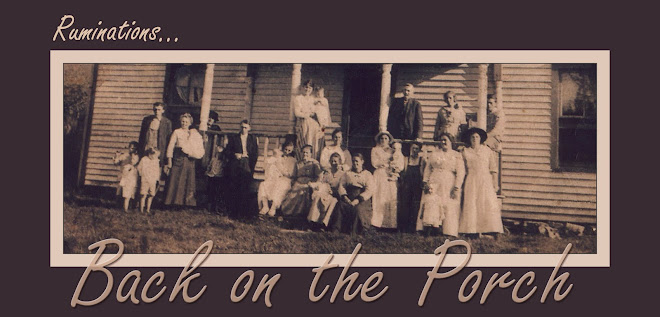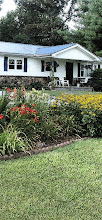If all the beast were gone, men would die from a great loneliness of spirit, for whatever happens to the beasts also happens to the man...Chief Seattle
This Red Wolf at the Chattanooga Nature Center is part of a national reintroduction program.
Looking out the back door a couple weeks back, I saw a large coyote emerging from the woods and crossing our property.
Having just let Rocky, our new Schnauzer pup, out for a potty break and knowing that 'yotes are known to snack on small house pets I shot out the back door, called Rocky to me and loudly hollered "Get out of here!" at the trespassing canid.
Unfazed and unafraid, he stopped and casually looked in my direction then went on his way. Easily hopping across the pasture fence, he ambled down to the pond, sniffed around the banks then slowly left the property, giving me one last casual glance as he went.
Typically the 'yotes around here are out hunting from dusk until dawn but this was my second sighting of one crossing our property in the daylight hours. I've also seen a large one on a nearby farm - one Sunday morning being chased out of the pasture by an angry Holstein cow.


I have since found coyote tracks around our house in the snow. Some were a mere 2 to 3-feet from the front porch, the backyard gate and even on the carport. They may have been looking for the stray cat that's been hanging around or possibly planning a meal of the wild rabbits and field mice that also frequent our yard. But my greatest fear was that they were anticipating a 'snatch and grab' on a certain vulnerable little wiry haired pup that, when he was tiny, had to go pee pee several times a night.
Picture worth a thousand words: An urban coyote, in desperate need of a meal, makes off with someone's little pet.
Watching and learning...
I love watching wildlife and you might say I make a habit of studying their habits.
Coyotes are among the critters that fascinate me. Throughout the ages other species have fallen victim to man's dominance over the environment and simply ceased to exists, failing to adapt and survive. Coyotes, on the other hand, have not only survived they have thrived. By moving into our neighborhoods and observing and learning from our habits they have adapted their own habits and developed amazing survival skills.
Example of the coyote's creative survival skills. Riding does beat walking, right?
A coyote and red wolf hybrid in the wild.
Recently I watched an interesting show on Nat Geo about the first killing in recorded history of an adult human by coyotes. It happened in late 2009 in the Cape Breton Highlands National Park, Nova Scotia, Canada, when a 19 year old folk singer was attacked by two unusually large coyotes while she hiked along a well populated trail. The aggressive coyotes were later hunted down and destroyed by wildlife officers who knew they had the right animals because one had been shot at the scene while it stood guard over the seriously injured woman. Only after being shot and wounded did it flee the area allowing rescuers to start medical treatment. In spite of their best efforts the victim died a few hours later, having sustained massive injuries and substantial blood loss. During necropsy of the animals human remains were found in the stomach of the second coyote.
During the subsequent investigation of the incident, DNA testing showed the coyotes to be wolf hybrids thus partially explaining their large size, aggression and lack of fear as they attacked the young woman in broad daylight in a place frequented by hundreds of humans each year.Picture worth a thousand words: An urban coyote, in desperate need of a meal, makes off with someone's little pet.
Watching and learning...
I love watching wildlife and you might say I make a habit of studying their habits.
Coyotes are among the critters that fascinate me. Throughout the ages other species have fallen victim to man's dominance over the environment and simply ceased to exists, failing to adapt and survive. Coyotes, on the other hand, have not only survived they have thrived. By moving into our neighborhoods and observing and learning from our habits they have adapted their own habits and developed amazing survival skills.
Example of the coyote's creative survival skills. Riding does beat walking, right?
A coyote and red wolf hybrid in the wild.
Recently I watched an interesting show on Nat Geo about the first killing in recorded history of an adult human by coyotes. It happened in late 2009 in the Cape Breton Highlands National Park, Nova Scotia, Canada, when a 19 year old folk singer was attacked by two unusually large coyotes while she hiked along a well populated trail. The aggressive coyotes were later hunted down and destroyed by wildlife officers who knew they had the right animals because one had been shot at the scene while it stood guard over the seriously injured woman. Only after being shot and wounded did it flee the area allowing rescuers to start medical treatment. In spite of their best efforts the victim died a few hours later, having sustained massive injuries and substantial blood loss. During necropsy of the animals human remains were found in the stomach of the second coyote.
"It's very unusual and is not likely to be repeated," said Bob Bancroft, a retired wildlife biologist with Nova Scotia's Department of Natural Resources. "We shouldn't assume that coyotes are suddenly going to become the big bad wolf."
Coywolf: Smart and wily as "regular" coyote...wise and proficient as a wolf.
I have since learned the coyote/wolf crossover is not a new phenomenon. It's likely that the interbreeding of the two canid species occurred decades ago as coyote populations expanded their western range into areas of northeastern America and southeastern Canada and the endangered Red Wolf populations dwindled. The mix has been somewhat advantageous to what is now known as the "Eastern Coyote" that heavily populates that part of the country. They are bigger, stronger and wiser than their western cousins...although I must say it was not very wise of the two rogues to kill a human.
Coywolves, as they are unofficially called, now reportedly inhabit most if not all northeastern states and their ranges are ever expanding. I'm wondering how long it will be before testing shows we have them here? If they're really smart, they'll keep it on the down low, stay out of the light and stick to eating wild game like rabbit and venison. Having taken on the wolf pack characteristic of cooperative hunting, the bigger guys have no problem pulling down grown deer and there are reports of them taking grown cattle as well. They have been touted for helping to keep deer populations under control and chastised for taking man's domestic animals.
I've often heard people say, "We've got to get rid of them (coyotes)!" Well guess what folks, that ain't likely to happen. The battle against this "pest" will go on and on. Drop him off a cliff, blow up his den with dynamite, slam him with a truck and he'll simply pop right back up and do what he has to do to survive. The only thing missing is the "Beep, Beep!" as he heads off down the road, blowing dust in our face as he goes. Whether you like him or not, you've got to respect that kind of tenacity. And we best watch and learn...watch and learn.
Interesting Sidebar (but gruesome image):

JEFFERSON CITY Mo – DNA tests show that the 104-pound canine above, shot by a hunter in Carroll County on Nov. 13, 2010, was an unusually large coyote, according to authorities there. But experienced hunters who have encountered and killed hundreds of coyote argue that this is no pure blood coyote and some even go so far as to accuse authorities of lying about the DNA test results. They think it is actually either a coyote/wolf (coywolf) or coyote/dog (coydog) hybrid.
Research has shown that the "Eastern Coyote" which now populates eastern Canada and much of northeastern United States all carry wolf DNA and are indeed "Coywolves". They are said to be much larger than Western Coyotes and more aggressive and, while being wary, are generally unafraid of humans. Their territory is ever expanding and they inhabit all areas without discretion - large cities, towns, farms, and subdivisions - that offer prey and/or scavenged food sources in abundance.













No comments:
Post a Comment